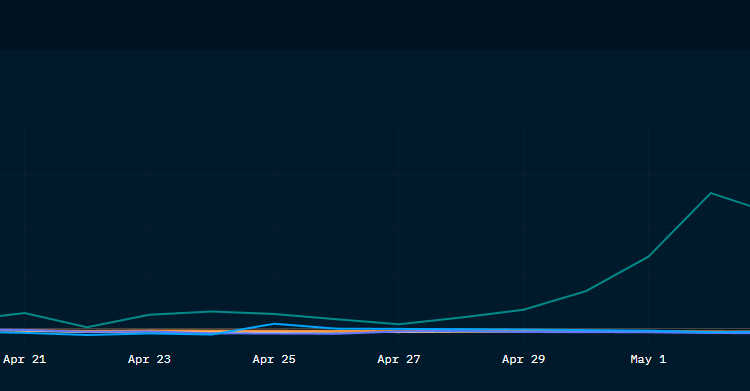Memecoins have been part and parcel of the cryptocurrency space since the inception of Dogecoin back in 2013, with fortunes made and ruined in equal measure. But a new token on the block caused a stir in recent weeks, as Pepe (PEPE) grabs a chunk of the memecoin market share from plucky investors.
As previously reported by Cointelegraph, PEPE saw a 2,000% boom in value following its launch in late April 2023. The token’s rally is primarily attributed to zealous memecoin hype, with the project widely shared on Twitter over the past month.
Today. $PEPE #MMGA pic.twitter.com/Adf0Vem8B3
— Pepe (@pepecoineth) April 14, 2023
The Pepe website itself is brandished with a closing disclaimer, labeling PEPE as “a meme coin with no intrinsic value or expectation of financial return.“ The project also stipulates that it has no formal team or roadmap and that the token is “completely useless and for entertainment purposes only.“
Data analytics firm Nansen provided insightful data and key takeaways following the rise of PEPE’s market capitalization. Research analyst Xin Yi estimated that the total memecoin market value is around $20 billion, with the top five tokens, Dogecoin (DOGE), Shiba Inu (SHIB), PEPE, Baby Doge Coin (BABYDOGE) and Floki (FLOKI), accounting for over $18 billion of the value.

Data provided from Nansen Query shows the massive spike in token value and market capitalization of PEPE in relation to the other top five memecoins. Yi also notes that the infographic does not paint a complete picture, given that the data for PEPE reflects its listing on CoinGecko, which came a couple of weeks after its inception.

Yi told Cointelegraph that the social aspect of memecoins remains a significant driver of investor sentiment and action, highlighting the likes of Elon Musk’s infamous Dogecoin touts and rampant Twitter bots driving memecoin hashtags to relevance on Twitter:
“Since memecoins have no intrinsic value, it relies on catalysts such as social relevance and also events like 4/20, which is known as DOGE day, can affect the prices of the token as well.”
As previously explored, Nansen provides data analytics and insights into “smart money” cryptocurrency traders and holders by labeling wallets and tracking trades. The rise of PEPE has also attracted a significant number of smart money holders, as per on-chain data highlighted by Yi. She added that a few thousand traders might benefit from the surge in the value of memecoins, which is a gamble given that many other memecoins are pump-and-dump or rug-pull schemes:
“Nonetheless, gains on one good coin can easily surpass the cost of the other ‘failed’ coins, which is probably why these memecoins remain attractive for most traders to ape into. Hence, it really depends on the investor’s risk appetite.”
Nevertheless, Yi also pointed out that the inherent risk of memecoins often leads to liquidity crunches, where major tokenholders dump their holdings, leaving smaller investors reeling from losses.
Related: Ethereum gas fee jumped due to memecoin frenzy with mixed comments on network usability
A number of cryptocurrency exchanges listed PEPE in the wake of its launch and subsequent investor appeal, including the likes of OKX, MEXC Global, Bitget, Gate.io and Huobi.
Magazine: Justin Sun’s SUI-farming sins, PEPE’s wild run, 3AC’s oyster philosophy: Asia Express

